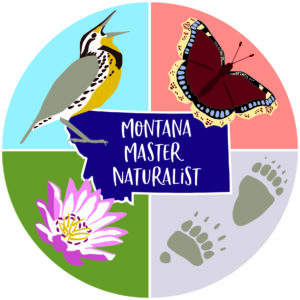


Discover Montana’s natural world and become a leader in conservation education through the Montana Master Naturalist Program. Designed to deepen natural history knowledge and foster stewardship of our environment, this program equips participants with the skills to engage in conservation efforts within their communities.
At the heart of the program is the Montana Master Naturalist Certification Course, a 45-hour immersive experience combining classroom learning and hands-on fieldwork. Upon completion, participants earn the Montana Master Naturalist certification, joining a statewide network of informed and dedicated naturalists.
The Montana Audubon Center serves as the program’s home in Billings, collaborating with the Montana Natural History Center in Missoula to provide state-wide certification. To maintain certification, Master Naturalists commit to 20 hours of volunteer service and 8 hours of continuing education each year.
Join us in exploring, understanding, and protecting Montana’s diverse ecosystems!
$450 (Center Members Receive $25 Discount)
*Members check your emails for this year’s code!
“The Master Naturalist class has truly enriched my life. I am more observant now than I ever was. How rewarding to know even more about the living things I share the environment with.” ~D.M., Billings Master Naturalist student 2018
“This was an excellent course. It left me wanting to learn even more, and gave me the resources to do so on my own.” ~M.H., Billings Master Naturalist student 2020
To maintain their certification, Master Naturalists are required to complete 20 hours of volunteer service and 8 hours of continuing education each calendar year.
If you need the password, please contact Christine Morris (cmorris@montananaturalist.org) at the Montana Natural History Center
Recertification Deadline: January 1. For example, if you graduated in 2020, your deadline is Jan. 1st, 2022.
Stay in the loop for continuing education & volunteer opportunities in the Billings area. Join the Master Naturalist graduate Google Group by contacting Emily Chilcoat, at echilcoat@mtaudubon.org
The activity needs to:
Each volunteer service activity may fit under one of these categories: Citizen Science, Stewardship, Education, Organizational Support, Other.
Citizen Science involves volunteers assisting with scientific research. These projects usually involve gathering data and returning it to researchers. Examples include:
Stewardship includes natural resource management activities. Examples include:
Education includes the presentation and/or development of educational materials. Examples include:
Organizational Support projects include working to ensure the functioning of any conservation/environmental organizations. Examples include:
Other projects should be described when you submit hours
Montana Master Naturalist continuing education needs to:
Most activities will:
Examples include:
Where to find continuing education opportunities in the Billings’ area: